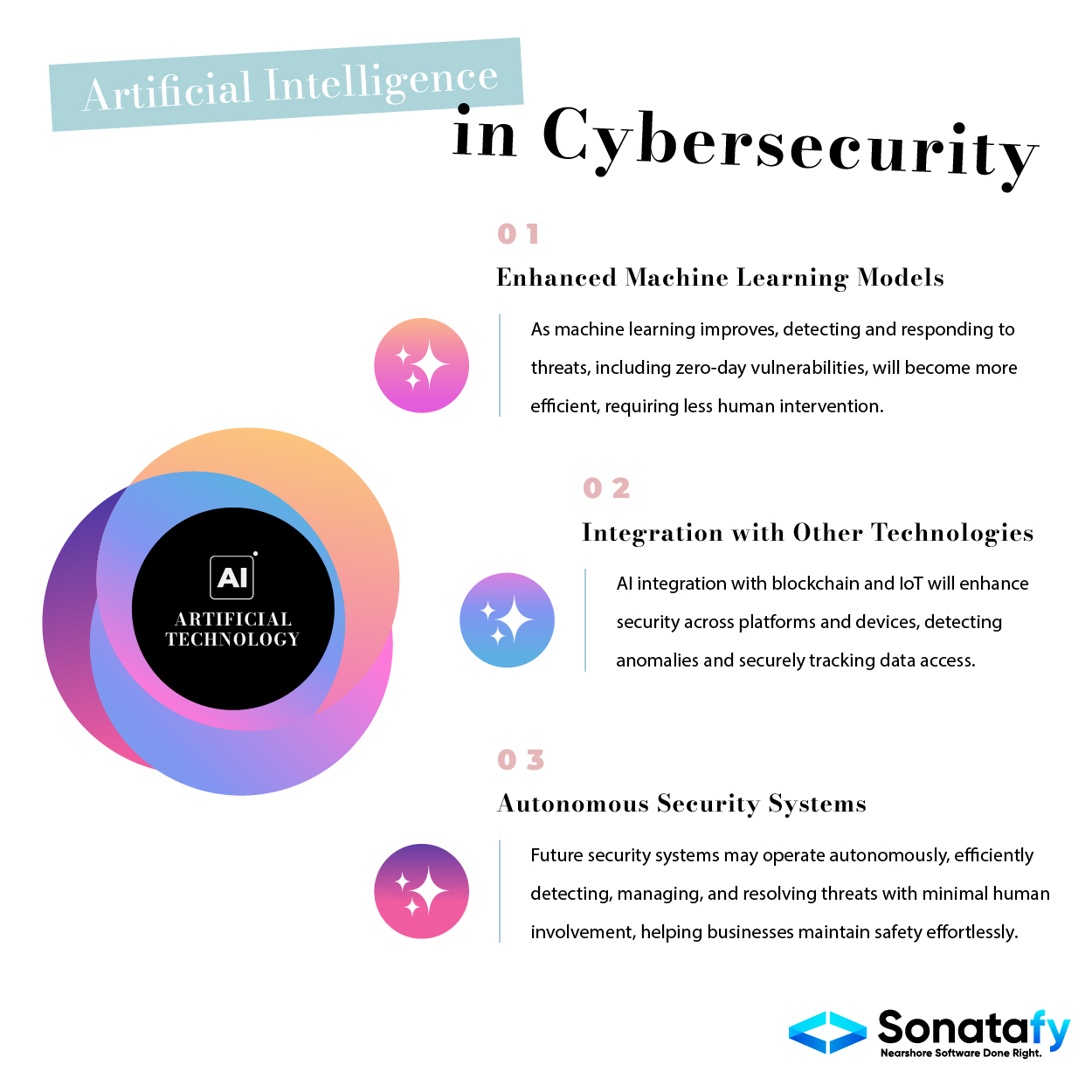Artificial Intelligence (AI) is becoming an essential part of cybersecurity. AI enables companies to detect, prevent, and respond to cyber threats faster and more efficiently. It’s amazing how much technology has advanced!
The Growing Necessity for AI-Driven Cybersecurity
As the tech gets better, so do the hackers. They know what they are doing and become more confident in their attacks. Old security models that rely on predictability are no longer effective against today’s threats. Outdated security strategies based on predictability are ineffective in today’s threats. But AI is getting involved at this point. AI is critical to cybersecurity because it allows it to learn and adapt to new threats. It helps companies secure their critical data and systems and stay ahead of the game.
Adaptive Threat Detection
AI is really good at identifying dangers humans might miss. It can look at patterns and things that seem weird and help us figure out where things are going wrong. We can teach it to learn from loads of data so it can tell us if there’s something that looks like a problem. This means we can act fast and stop something wrong from happening before it causes too much trouble.
Automated Response Systems
It is important to identify the threat and act immediately. Fortunately, AI-powered systems can start and complete tasks automatically. By isolating affected networks or devices, they can prevent the spread of malware or the destruction of an attack. This quick action is key to keeping security breaches from becoming a total disaster.
Enhancing Security Protocols with AI
AI plays an important role in the security world. It can detect and respond to threats and help improve existing security measures. AI may make recommendations for improving security mechanisms and maintaining them current with the most recent attack techniques by continuously learning from new data.
Continuous Learning
AI is amazing! It constantly learns from its interactions and can adapt to new threats quickly. Unlike static systems, AI-based cybersecurity tools keep getting better with time. They adjust their algorithms based on new data and the latest trends in the threat landscape.
Predictive Capabilities
AI is smart at predicting future attacks. It does this by looking at past attacks and figuring out what kind of attacks might happen next and who might be in trouble. This way, companies can plan ahead instead of waiting for something bad to happen.
Ethical Considerations and Challenges
While AI has advantages in cybersecurity, we must always consider the ethical implications. Using AI responsibly without violating people’s privacy or causing bias is a challenge. We should also make sure bad guys don’t abuse AI for their evil plans. We must be responsible for using AI in cybersecurity, from its development to implementation.
Privacy and Data Protection
AI needs a lot of data, some of which could be confidential, and this data should be protected and handled according to the law. It’s essential to design models that don’t exploit the data.
Mitigating AI Vulnerabilities
AI systems are just like any other tech and can be hacked. Hackers can mess with AI tools by creating inputs that trick them. It’s crucial to prevent these attacks on so our cybersecurity doesn’t fail.
Future Trends in AI-Driven Cybersecurity
Artificial Intelligence (AI) will play an important role in cybersecurity in the future. It’s going to bring both new problems and new chances. You gotta keep up with the times and know what’s coming to stay ahead of the game.

Enhanced Machine Learning Models
Threat detection and reaction will become easier as machine learning algorithms advance. There will be more sophisticated models capable of handling large amounts of data accurately and usably with minimal human intervention. These models will be super important for finding zero-day vulnerabilities – those software glitches that nobody knows about yet and hackers use to their advantage before the software makers can fix them.
Integration with Other Technologies
AI will eventually be combined with other exciting technologies like blockchain and the Internet of Things (IoT). This team-up will secure things across different platforms and devices, creating a more united and safe system. For example, AI can analyze data from various IoT gadgets to detect anything weird that could mean a security disaster. At the same time, blockchain can provide a safe and open way to record and watch who’s accessing data.
Autonomous Security Systems
In the future, we might have security systems that can work independently without humans. They’d be smart enough to spot and handle threats and even fix problems without anyone’s help. These systems would be super efficient and could help businesses stay safe without needing too much work from people.
Ethical and Regulatory Developments
As AI gets better, we need to be careful how we use it. We need to stay up to date with new rules and regulations that change how we use AI in cybersecurity. Companies and developers need to keep learning about these changes.
Global Standards for AI in Cybersecurity
It’s expected that there will be some global standards set up for using AI in cybersecurity in an ethical way. These standards will probably handle issues such as taking responsibility, being honest about what’s happening, and ensuring the data is correct. The goal is to make sure that AI is used responsibly and doesn’t harm people or companies.
Public Awareness and Education
It’s really important to let people know how AI can help improve cybersecurity. If we all learn about the cool things it can do and the potential problems it might face, we can all work together better. This way, developers, companies, and users can trust each other and work together more efficiently. In this way, more companies can start using AI responsibly and effectively.
Custom and Integrated AI Solutions
At Sonatafy Technology, we provide our clients with a comprehensive, end-to-end AI Journey, offering completely customized and fully-integrable AI solutions. Our AI resources are designed to help clients dramatically accelerate the integration of AI into their business and gain the advantage of staying ahead in our highly competitive tech landscape. Our expert AI team can help develop strategic and complex AI concepts, ensure data readiness, build the resources, and execute market-ready products. Use our customized AI Journey & Integration Process to significantly increase productivity and expand to new opportunities in tech!
Conclusion
The use of AI in cybersecurity is an ongoing process that calls for ongoing learning and modification. AI presents an incredible opportunity for companies to strengthen their security systems. To ensure that AI technologies are applied carefully and strategically, it is essential to ensure that AI tools are used ethically and effectively.
As people in the technology industry, we must stay aware and take charge of developing and managing AI-powered security systems. This way, we can effectively use AI to protect our digital systems while maintaining high ethical and security standards. The goal of cybersecurity in the future is to provide a reliable and accessible digital environment so great that anyone can use it, not just deal with threats.
Source: AI in Cybersecurity



